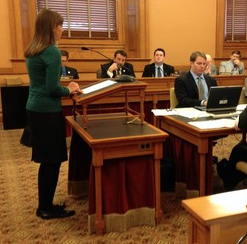
By Miranda Davis
KU Statehouse Wire Service
TOPEKA – A bill designed to improve the state’s welfare system could create barriers for public assistance recipients, some lawmakers and children’s advocates say.
House Bill 2600 aims to revise criteria for receiving government assistance. The bill would require an individual who receives receive Kansas Food Assistance to work 20 hours per week. It would reduce the time period an individual can receive benefits from the Temporary Cash Assistance for Needy Families (TANF) from 42 months to 30 months.
Also, the bill would require recipients of public assistance to self-report any fraud or be denied assistance.
Rep. John Whitmer, R-Wichita, called the bill “common-sense legislation,” when he spoke Tuesday at a meeting of the House Committee on Health and Human Services. Whitmer is a member of the committee.
However, Rep. Jim Ward, D-Wichita, and Rep. John Wilson, D-Lawrence, also committee members, expressed concerns about the negative effect that requirements could have on applicants who did not commit fraud with malicious intent. Ward said the legislation assumes bad motivations of those applying for benefits and is meant to shame welfare recipients instead of help them.
“Does it give you any sense of problem that you’re forcing people at the risk of losing their benefits to give evidence that might be against them and that right against self-incrimination?” Ward asked.
Committee member Rep. Dick Jones, R-Topeka, said it is reasonable for people to be silent when they don’t understand the welfare system or the repercussions of their answers to questions from the Department for Families and Children (DCF).
“So the question is, what do you do to protect those people who are confused and worried about saying the wrong thing that might get their husband or their wife thrown in jail?” Jones asked.
Wilson told the committee he is worried that children may be accidentally punished if their parents have committed fraud.
“I think what’s getting lost in all of this are the children, whose lives depend on these benefits. I don’t think they can control whether their parents play by the rules,” Wilson said.
Sandra Kimmons, the director of economic and employment services for DCF, said there are still ways to get aid to children even if the parents are denied benefits. She said the legislation is a way to make sure the people who need assistance the most are getting it.
“It is our ultimate goal to help individuals move from poverty to prosperity through self-reliance,” Kimmons said.
Kimmons also said fraud investigations are not randomized and only happen once DCF receives a tip about possible wrongdoing.
Ken Thompson, director of fraud investigations for DCF, said that investigations ensure fairness and keep people from abusing the system.
“If you want the assistance, play by the rules,” Thompson said.
In addition to the fraud-reporting requirement, the bill would also require that the Kansas Lottery send a monthly list of anyone who wins more than $10,000 so the DCF can check that list to make sure no TANF recipients have won.
Rabbi Moti Rieber, executive director of Kansas Interfaith Action, opposed the legislation and agreed with Ward’s belief that the legislation is “mean-spirited.”
“This particular bill seems like a solution in search of a problem, in that it imagines that someone has won $10,000 in the lottery, where I’d like to know if there’s actually been a case of that,” Rieber said.
Amanda Gress, director of government relations for Kansas Action for Children, also opposed the legislation because she said it creates additional barriers for children to access the state’s safety net.
Edited by Leah Sitz
